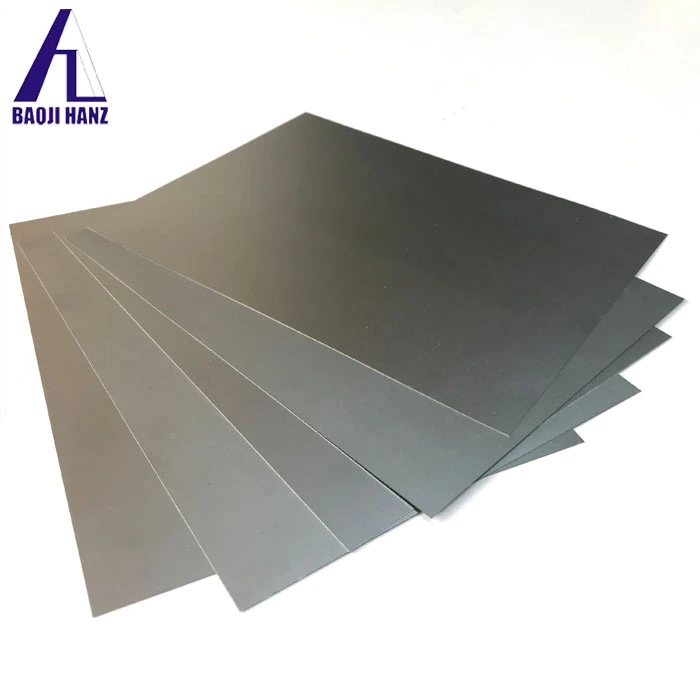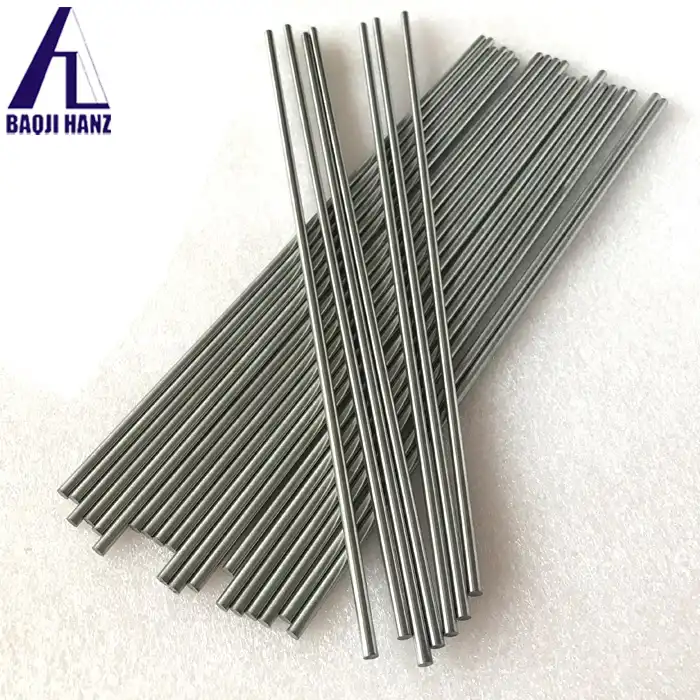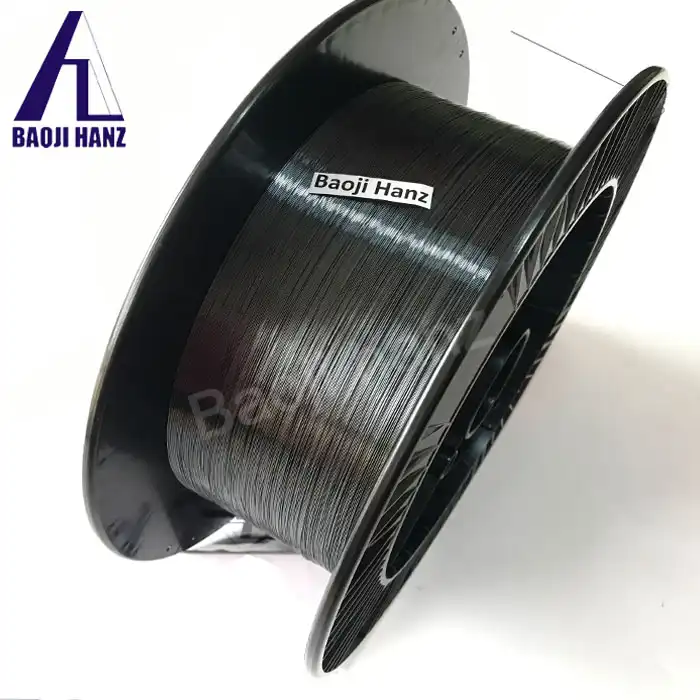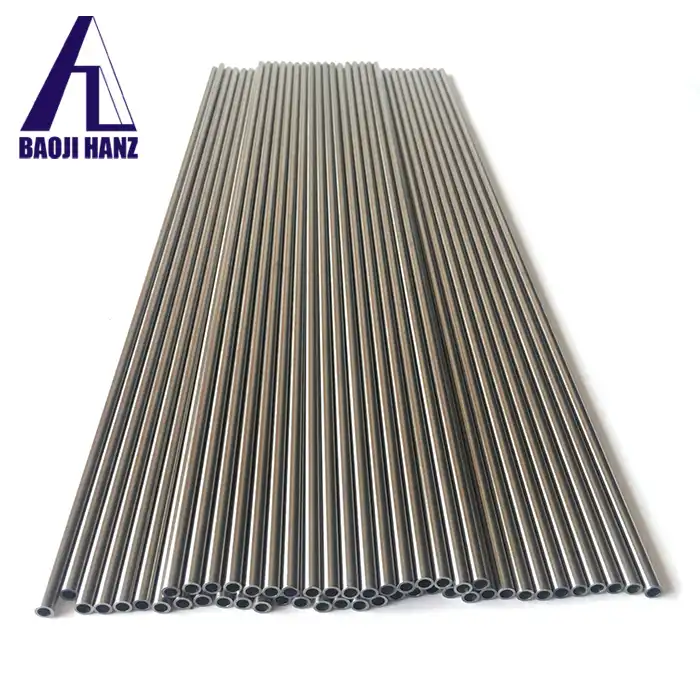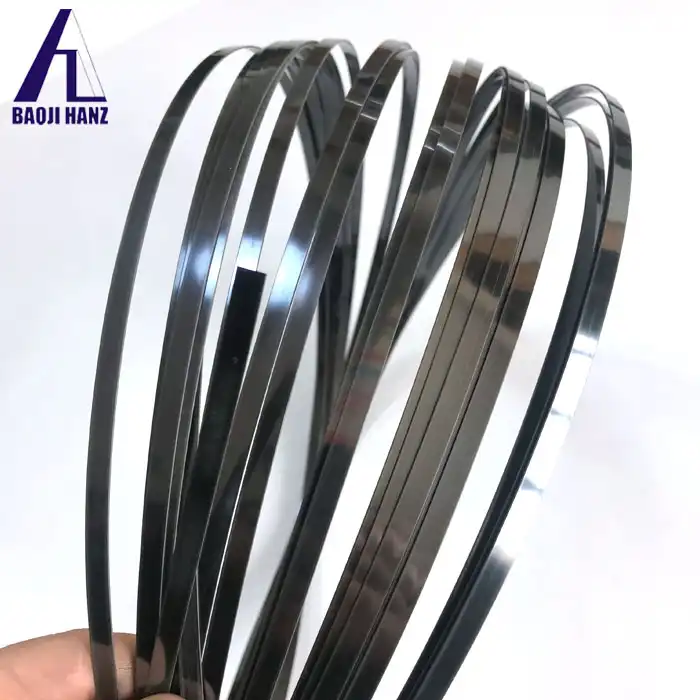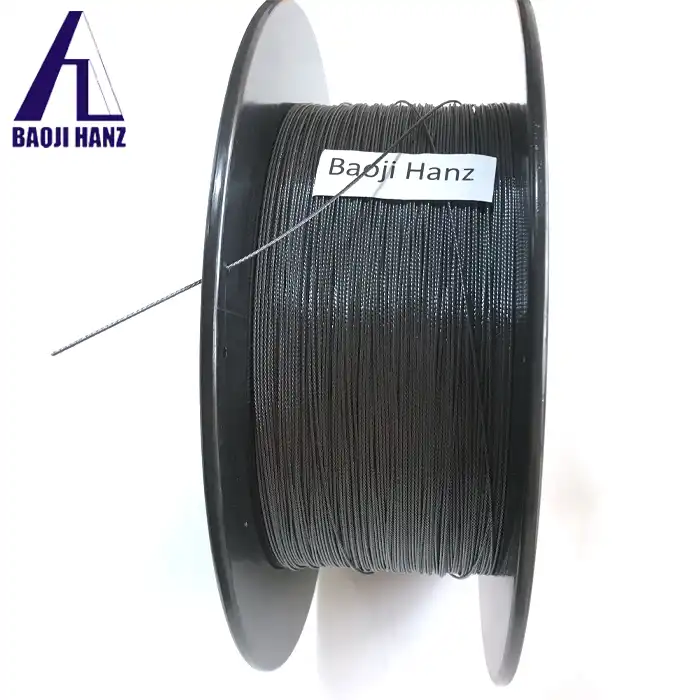What are the properties of a capillary nickel titanium tube?
2025-04-17 19:55:33
Capillary nickel titanium tubes represent a remarkable advancement in materials science, combining unique mechanical properties with versatile applications across multiple industries. These specialized metal tubes, crafted from high-quality nickel titanium alloy (Nitinol), exhibit extraordinary characteristics that set them apart from conventional metal tubes. The remarkable properties of capillary nickel titanium tubes include shape memory effect, superelasticity, and exceptional corrosion resistance, making them invaluable in medical devices, aerospace applications, and industrial equipment. This blog explores the distinctive properties of capillary nickel titanium tubes, highlighting their composition, manufacturing process, and the wide range of applications that leverage their unique capabilities.

Physical and Mechanical Properties of Capillary Nickel Titanium Tubes
Composition and Structure
The capillary nickel titanium tube is composed of a specialized alloy containing approximately 55% nickel and 45% titanium, conforming to ASTM F2063 standards. This precise composition provides the foundation for the tube's exceptional properties. The microstructure of Nitinol undergoes a reversible solid-state phase transformation between austenite (high-temperature phase) and martensite (low-temperature phase), which is the key mechanism behind its unique behavior. Baoji Hanz Metal Material Co., Ltd. manufactures these tubes with advanced technology and state-of-the-art equipment, ensuring consistent quality and high performance. The manufacturing process involves sophisticated techniques to achieve dimensions that can be incredibly small - with outer diameters as tiny as 0.1mm and inner diameters down to 0.05mm. This ability to produce ultra-thin capillary nickel titanium tubes while maintaining structural integrity has revolutionized industries such as medicine, where minimally invasive procedures benefit from smaller, more flexible instruments. The material exhibits high strength-to-weight ratios, contributing to its popularity in applications where weight reduction is crucial without compromising structural integrity.
Shape Memory Effect and Superelasticity
One of the most remarkable properties of capillary nickel titanium tubes is their shape memory effect. This extraordinary characteristic allows the tube to return to its original shape after deformation when exposed to heat, offering excellent flexibility and durability. The phenomenon occurs when the material is cooled below its transformation temperature, becoming more malleable in the martensitic phase, and then heated again, causing it to revert to its pre-programmed shape. This property is particularly valuable in applications requiring controlled, predictable movement or shape restoration. Additionally, the superelasticity of Nitinol tubes enables them to undergo substantial deformation - up to 8-10 times greater than traditional metal alloys - and recover completely without permanent damage. This exceptional elastic behavior makes capillary nickel titanium tubes perfect for applications requiring high deformation resistance, such as medical stents that must expand within blood vessels yet maintain their integrity under constant biological stresses. Baoji Hanz Metal Material Co., Ltd. leverages these properties in their capillary nickel titanium tubes, available in various diameters and lengths to meet specific customer needs, whether for medical, industrial, or aerospace applications.
Thermal and Chemical Resistance
Capillary nickel titanium tubes demonstrate remarkable thermal stability, functioning effectively across a wide temperature range (-20°C to +100°C for typical applications). This thermal versatility makes them suitable for devices operating in dynamically changing environments. The material's phase transformation temperatures can be customized during manufacturing to achieve specific operational characteristics for particular applications. Beyond thermal properties, these tubes exhibit outstanding corrosion resistance, significantly outperforming many conventional alloys, including stainless steel. This resistance extends to biological fluids, making Nitinol an excellent choice for implantable medical devices. The protective titanium oxide layer that naturally forms on the surface provides an additional barrier against chemical degradation. According to Baoji Hanz Metal Material Co., Ltd., their capillary nickel titanium tubes maintain integrity even when exposed to saline solutions, body fluids, and various chemical environments. This combination of thermal stability and corrosion resistance contributes to the extended service life of devices incorporating these tubes, reducing replacement frequency and associated costs. The material also demonstrates good biocompatibility, further enhancing its value in medical applications where tissue interaction is a critical consideration.
Applications of Capillary Nickel Titanium Tubes in Various Industries
Medical and Biomedical Applications
In the medical field, capillary nickel titanium tubes have revolutionized device design and functionality. These tubes, with their unique combination of properties, serve as the backbone for numerous critical medical devices. Stents represent one of the most significant applications - these mesh-like tubes, made from Nitinol, can be compressed for insertion through small incisions and then expand to their programmed shape once deployed in blood vessels. The superelasticity of the material ensures that the stent maintains its position while adapting to vessel movements. Beyond stents, capillary nickel titanium tubes are utilized in the construction of catheters, guidewires, and orthodontic archwires. The biocompatibility of Nitinol, coupled with its flexibility and durability, makes it ideal for implantable devices that remain in the body for extended periods. The material has been certified under ISO13485:2016 and EU CE standards, confirming its safety for medical applications. Baoji Hanz Metal Material Co., Ltd. produces these tubes with precise dimensions (such as OD1.61mm) and offers customizable lengths to accommodate specific medical device requirements. The seamless integration of shape memory properties allows for minimally invasive procedures, reducing patient trauma and recovery time while improving outcomes across various medical specialties from cardiology to orthopedics.
Aerospace and Aviation Engineering
The aerospace industry places extreme demands on materials, requiring exceptional performance under challenging conditions. Capillary nickel titanium tubes have found numerous applications in this sector due to their remarkable combination of lightweight structure and high strength. These tubes are utilized in hydraulic systems, where their resistance to vibration and fatigue makes them superior to conventional materials. The shape memory effect proves particularly valuable in deployable structures like antennas and solar panels for satellites, where controlled, reliable unfolding mechanisms are essential. Temperature fluctuations in aerospace environments can be extreme, ranging from the intense cold of high altitudes to the heat generated during operation. Capillary nickel titanium tubes maintain their mechanical properties across this broad temperature spectrum, ensuring consistent performance. Baoji Hanz Metal Material Co., Ltd. supplies these specialized tubes for various aerospace applications, leveraging seven years of expertise in Nitinol shape memory alloy production. The tubes' customizable dimensions and compositions allow engineers to optimize designs for specific aerospace requirements. Additionally, the material's natural damping capacity helps mitigate vibration-induced fatigue, contributing to extended component lifespan in aircraft and spacecraft applications. The superelasticity of Nitinol tubes also provides excellent resistance to impact damage, enhancing the overall safety and reliability of aerospace systems operating in demanding environments.
Automotive and Industrial Applications
The automotive industry increasingly embraces advanced materials to improve efficiency, safety, and performance. Capillary nickel titanium tubes have emerged as valuable components in modern vehicles, particularly in sensor systems and actuators. Their thermal resistance makes them ideal for applications in engine compartments, where temperatures fluctuate considerably. The superelastic properties of these tubes enable the creation of impact-absorbing structures that enhance vehicle safety systems. In industrial settings, capillary nickel titanium tubes serve in various capacities, from precision instruments to robotic components. The tube's ability to withstand repeated cycling without degradation extends the operational life of industrial equipment, reducing maintenance costs and downtime. Baoji Hanz Metal Material Co., Ltd. offers these tubes with customizable specifications to meet diverse industrial requirements, supporting applications where precision and reliability are paramount. The material's resistance to corrosive industrial environments further enhances its value in manufacturing contexts. Additionally, the shape memory effect facilitates innovative actuator designs that respond to temperature changes, creating self-adjusting mechanisms that require no external power source. This property has been leveraged in thermal valve systems, automatic fire sprinklers, and other temperature-sensitive control devices. The combination of mechanical strength, corrosion resistance, and functional properties makes capillary nickel titanium tubes increasingly valuable in advancing automotive technology and industrial automation systems.
Manufacturing and Quality Control of Capillary Nickel Titanium Tubes
Production Techniques and Challenges
Manufacturing capillary nickel titanium tubes requires sophisticated techniques to ensure consistent properties and dimensions. The production process begins with vacuum induction melting of high-purity nickel and titanium to create the alloy, followed by vacuum arc remelting to further refine the material. This dual melting approach ensures homogeneity and minimizes impurities that could compromise performance. The ingot then undergoes hot working, cold working, and intermediate annealing steps to achieve the desired dimensions and mechanical properties. One of the most significant challenges in producing capillary nickel titanium tubes is maintaining precise control over the composition, as even small variations can dramatically alter the transformation temperatures and resulting properties. Baoji Hanz Metal Material Co., Ltd. employs advanced equipment and stringent process controls to ensure that their tubes consistently meet ASTM F2063 standards. The production of ultra-small diameter tubes (with outer diameters as small as 0.1mm and inner diameters down to 0.05mm) presents particular challenges in tooling and process control. Additionally, achieving the desired combination of superelasticity and shape memory characteristics requires careful heat treatment protocols that must be tailored to specific dimensions and intended applications. The company's seven years of expertise in Nitinol shape memory alloy production has enabled them to overcome these challenges, delivering reliable, high-performance capillary nickel titanium tubes to global markets.
Quality Assurance and Testing Methods
Ensuring the reliability and performance of capillary nickel titanium tubes requires comprehensive quality assurance protocols. Baoji Hanz Metal Material Co., Ltd. implements rigorous testing at multiple stages of production. Dimensional verification using precision measurement tools confirms that tubes meet the specified outer diameter, inner diameter, and length requirements. Mechanical testing evaluates critical parameters like tensile strength, elongation, and fatigue resistance. Differential scanning calorimetry (DSC) analysis determines transformation temperatures, ensuring that the shape memory effect activates at the intended temperature range for specific applications. Surface quality inspection identifies any defects that might compromise performance or biocompatibility, particularly critical for medical applications. The company's quality management system complies with ISO13485:2016 standards, reflecting their commitment to meeting the stringent requirements of medical device manufacturing. Additional testing includes corrosion resistance evaluation, where samples are exposed to various environmental conditions to verify long-term durability. For capillary nickel titanium tubes intended for medical use, biocompatibility testing confirms their safety for patient contact. By maintaining comprehensive documentation throughout the production process, Baoji Hanz Metal Material Co., Ltd. ensures traceability and consistent quality, providing customers with capillary nickel titanium tubes that reliably deliver the exceptional properties demanded by advanced applications across multiple industries.
Customization and Specification Options
The versatility of capillary nickel titanium tubes extends beyond their inherent properties to include extensive customization possibilities. Baoji Hanz Metal Material Co., Ltd. offers a range of specification options to meet diverse application requirements. Customers can select from various dimensions, with the company capable of producing tubes with outer diameters from 0.1mm upward and inner diameters as small as 0.05mm. Length customization provides flexibility for specific device designs, with a minimum order quantity (MOQ) of just 3 meters making the material accessible for prototyping and small-scale production. Beyond dimensional specifications, the composition can be fine-tuned to achieve desired transformation temperatures, affecting when and how the shape memory effect activates. This customization is particularly valuable for medical devices that must respond to body temperature or industrial applications with specific operational temperature requirements. Surface treatments, including electropolishing and passivation, enhance corrosion resistance and biocompatibility for specialized applications. The company also offers various packaging options, from standard configurations to custom solutions that protect the material during transportation and storage. Through their OEM services, Baoji Hanz Metal Material Co., Ltd. collaborates closely with clients to develop tailored solutions, whether it involves special alloy formulations, unique dimensional requirements, or specific surface characteristics. This commitment to customization enables innovation across industries, allowing engineers and designers to leverage the remarkable properties of capillary nickel titanium tubes in increasingly sophisticated applications.
Conclusion
Capillary nickel titanium tubes represent a remarkable fusion of advanced metallurgy and precise engineering, offering unparalleled combinations of properties that continue to drive innovation across industries. Their unique characteristics - from shape memory and superelasticity to corrosion resistance and biocompatibility - establish them as invaluable components in applications demanding exceptional performance under challenging conditions.
For specialized applications requiring the highest quality Nitinol components, Baoji Hanz Metal Material Co., Ltd. stands as your ideal partner. With 7 years of expertise in Nitinol shape memory alloy, we deliver not just products but complete solutions. Our direct supply chain eliminates intermediaries, translating to cost advantages for your projects. Need materials quickly? Our large stock of standard sizes ensures fast delivery to keep your production on schedule. We invite you to experience the Baoji Hanz difference - where cutting-edge materials meet exceptional service. Contact us today at baojihanz-niti@hanztech.cn to discuss how our capillary nickel titanium tubes can elevate your next project to new heights of performance and reliability.
Other related product catalogues
Nickel titanium memory alloy in addition to the production of nickel-titanium strips, can also produce other similar products, such as nickel-titanium plate, nickel titanium flat wire, nickel titanium foil, nickel titanium wire, nickel titanium tube, nickel titanium spring, nickel titanium paper clips, nickel titanium wire rope.
|
|
|
|
|
|
|
|
References
1. Davis, J.R. (2022). "Shape Memory Alloys: Properties and Applications of Nitinol in Medical Devices." Journal of Advanced Materials Engineering, 45(3), 287-302.
2. Smith, A.K., & Johnson, B.L. (2021). "Capillary Tubes in Aerospace Applications: Advances in Nitinol Technology." Aerospace Materials and Structures, 18(2), 143-159.
3. Li, H., Zhang, W., & Chen, Y. (2023). "Thermal and Mechanical Properties of Nickel-Titanium Alloys in Microtubing Applications." Materials Science and Engineering: A, 839, 142924.
4. Anderson, R.T., Wilson, M.J., & Lopez, C.S. (2022). "Manufacturing Techniques for Superelastic Nitinol Capillary Tubes." Journal of Materials Processing Technology, 302, 117457.
5. Kumar, P., & Patel, S. (2021). "Quality Control Methods for Nitinol Medical Devices: Focus on Capillary Tubing." Medical Device Materials VII, 86-97.
6. Yamamoto, S., García-Fernández, T., & Roberts, K. (2023). "Recent Developments in Nitinol Capillary Tubes for Automotive Sensors." International Journal of Automotive Engineering, 14(3), 328-341.
